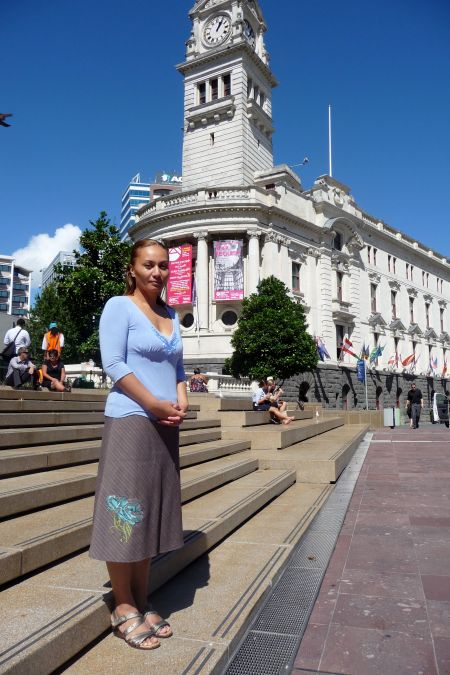AUCKLAND, NEW ZEALAND—Poetry readings, public discussions and direct actions have breathed new life into Idle No More, the Indigenous movement that spread like wildfire across Canada beginning in December 2012. What's different about these actions, which follow hundreds of others in North America, is that they didn't happen in Canada, or even in the US; instead, they've taken hold across the Pacific, in Aotearoa (New Zealand).
The Dominion caught up with Māori activist Marama Davidson in March 2013 at an Auckland café next to the site of the Occupy camp that she was also involved in. Davidson explained why some Māori activists had chosen to adopt the slogan of a movement born so far from their own local struggles.
“What I think Idle No More can hopefully do for us in New Zealand is be another tool and another resource to keep re-educating, motivating and mobilizing people,” Davidson said, sipping on a cup of coffee.
Under the Idle No More banner, actions across the small island nation have gained momentum through an online campaign, visual and performance-art projects and other actions. Davidson explained, “We have had seminars, teach-ins and community group meetings, where people are using Idle No More to try and encourage and invite more people to say ‘Yes, we all need to stand up for the environment.’”
Davidson is a founding member of the Māori women’s collective Te Wharepora Hou, a group established “to be a strong voice for upholding a newer and better way of living on the planet and the well-being of people on the ground.”
Te Wharepora Hou has managed to build links with Indigenous people around the world, including in Canada. This, combined with a strong social media presence, made it possible to connect with Idle No More quickly after the movement was kick-started by another small group of Indigenous women in Saskatoon last December. The collective’s vision fit so neatly with the values of Idle No More, “It was more a question of how could we not support it?” Davidson told The Dominion.
The struggles of Māori people in New Zealand today centre around the struggle for tino rangatiratanga (the right to self-determination). Davidson said, “It always comes back to Māori being afforded the responsibility to be true caregivers and to have the control of resources and their people.”
Indigenous rights in New Zealand have a legal basis dating back 170 years, to when the British Crown signed the Treaty of Waitangi in conjunction with a select group of Māori leaders. Since then, Māori people have experienced ongoing violations of their legally-enshrined treaty rights, including the theft of ancestral lands and marginalization from political power.
Davidson explained how, in a remote town in the Bay of Plenty region of the North Island, Māori representatives of Te Whanau-a-Maruhaeremuri staged an occupation in January 2013 that successfully stopped a company removing shingle from the local Raukokore River. “The leader of the occupation said, ‘This is all part of Idle No More. This is about us standing up,’” Davidson told The Dominion. “Here they are in the middle of nowhere and they have cottoned on to this global movement and are using it to enforce what they are doing.”
Idle No More hit a nerve with people like Davidson, who believe in fighting for meaningful self-determination, not tweaks to the current colonial system. “My bigger vision for our communities is that more and more power can be claimed back by people on the ground, to actually care for and be responsible for their own place, rather than being dictated to and restricted by top-heavy government processes,” said Davidson. “What I would really love to see is local communities and grassroots groups taking charge and claiming back space to say, ‘We need to rejuvenate our river. It’s really dirty—let’s get the community involved. It’s part of our responsibility as humans.’”
“The way we’ve been consuming resources on the planet is not working. It’s not working for the planet and anything that doesn’t work for the planet doesn’t work for people,” said Davidson, pushing her empty cup to the side. “As Indigenous people we felt that we had a responsibility to step up to [Idle No More], but all humans can actually step up to caring for people and planet, so it’s not an exclusive movement.”
Jen Wilton and Liam Barrington-Bush are solidarity activists and journalists currently living in Oaxaca, Mexico. Jen tweets as @guerillagrrl and Liam tweets as @hackofalltrades.



